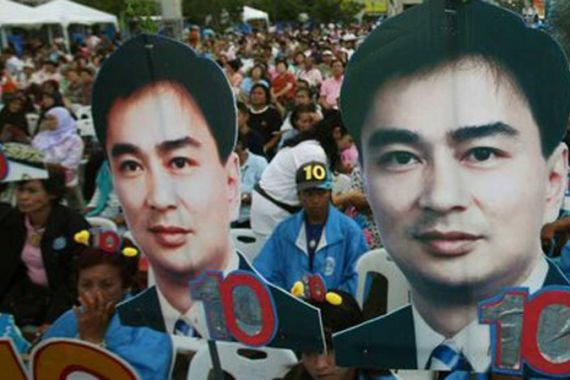Profile: Abhisit Vejjajiva
The privileged background of the young Abhisit may make it difficult for poorer voters to connect with him.

Abhisit Vejjajiva’s two-and-a-half years in office as prime minister of Thailand comes to an end with the general elections on Sunday.
Abhisit, 46, is a 20-year-veteran of Thai politics who has a loyal base among the local elite and foreign business community.
He comes from a wealthy family with two medical professors as parents – a distinctly upper class background.
A graduate of the UK’s elite Eton College and Oxford University, Abhisit was elected to power by the Thai parliament in December 2008 after a court forced former prime minister Thaksin Shinawastra’s allies from power in 2006.
At age 44, he became the country’s youngest prime minister in more than 50 years.
But he has found little support with rural northeastern Thais who make up the country’s majority and are the backbone of the support given to Thaksin Shinawatra.
On 13 April 2009, anti-government demonstrators attacked his Mercedes Benz at the interior ministry, threatening his life shortly after he declared emergency law in response to their disruption of the regional ASEAN summit in Pattaya, a city located about 165km southeast of Bangkok.
During much of the violent turmoil in April and May last year, Abhisit was forced to move his office to the compound of Infantry Regiment 11, on the outskirts of Bangkok, as red-shirted pro-Thaksin protesters took over portions of the capital demanding he dissolve parliament and call for a snap election.
Policies
Abhisit began his political career in 1992 when he joined the Democrat Party at age 27.
As he rose the party ranks he pushed a series of populist policies, campaigning under the slogan “Putting People First”.
Recently he has since been focused on promoting a transparent democracy while also maintaining his consistent anti-corruption stance.
Abhisit opposed the military in the 2006 oust of rival Thaksin, saying he expected high standards of probity from his party and any government he led.
“We cannot and do not support any kind of extra-constitutional change, but it is done. The country has to move forward and the best way forward is for the coup leaders to quickly return power to the people and carry out the reforms they promised,” he said.
His campaign pitch in February 2006 was “to become a prime minister who adheres to the principle of good governance and ethics, not authoritarianism”.
Abhisit has also pushed for stricter transparency and anti-corruption measures for Thai MPs, calling on all future Democrat Party representatives to declare their assets and any involvement in private companies.
However, those measures currently apply only to cabinet members, and has not shielded his government, or party, from corruption allegations, including claims of a cover-up of illegal donations by a petrochemical firm.
In line with his earlier populist views, Abhisit advocates free healthcare, a higher minimum wage, and free education, including textbooks and milk for nursery-school children.
Abhisit’s policies borrow heavily from Thaksin, in particular the commitment to continue the universal public healthcare scheme and cheap rural loans introduced during Thaksin’s five years in office.
But he also argues for a more statist approach to economics than Thaksin’s liberal reforms, or “Thaksinomics,” by vowing to push for more overseas free trade deals but simultaneously reversing Thaksin’s partial privatisation of some state firms.
Criticism
Critics say Abhisit is an opportunist who has received help from the military and the anti-Thaksin People’s Alliance for Democracy (PAD).
He failed to condemn the PAD, even when the demonstrators occupied Bangkok’s two airports late last month, and it was his party’s decision to boycott a snap election in 2006 that precipitated the constitutional crisis that eventually led to the coup against Thaksin.
Throughout the April-May 2010 turmoil involving “Red Shirt” protester, that left at least 91 dead and more than 2,000 injured, Abhisit kept his cool, some have said too much so.
In a bid to revive flagging enthusiasm for the Democrats in Bangkok, Abhisit recalled the trauma of April 10, last year, when protesters and authorities engaged in an especially bloody street battle on a Bangkok street that left 25 dead including five soldiers.
“I cried for a long time on April 10,” he said. “I knew that no matter what I decided, people would hate me.”